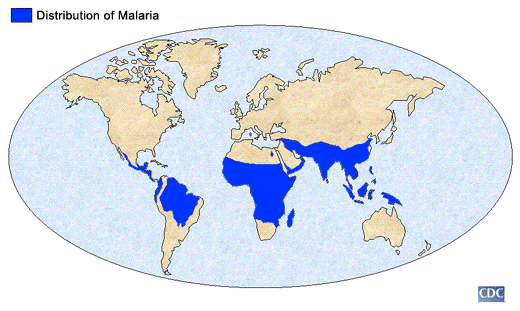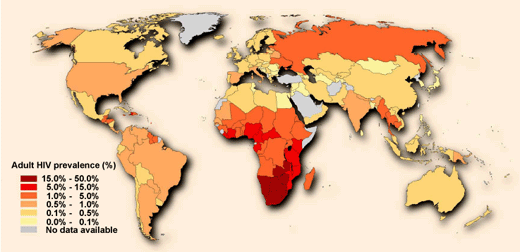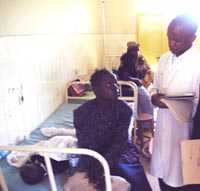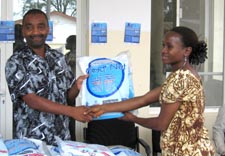|
|
|||||
|
|
The Link Between Malaria and HIV/AIDS The Geographic Link Malaria and HIV/AIDS overlap geographically---primarily in sub-Saharan Africa, Southeast Asia, and South America. Globally, malaria is responsible for more than a million deaths per year, with 90% of these deaths in sub-Saharan Africa. In 2003, HIV/AIDS caused the deaths of an estimated 2.9 million people worldwide, of whom 2.4 million lived in Africa. Worldwide Distribution of Malaria
Worldwide Distribution of HIV, End of 2004 
Source: WHO/UNAIDS The Health Link for People Who Live in Malaria Risk Areas While infection with either malaria or HIV can cause illness and death, infection with one can make infection with the other worse and/or more difficult to treat. The two diseases affect people who live in malaria risk areas in the following ways: Pregnant Women The consequences are especially serious for a pregnant woman with both malaria and HIV.
Adult Men and Nonpregnant Women For an adult man or a nonpregnant woman who lives in a malaria risk area,
Children For a child living in a malaria risk area,
Malaria Recommendations for HIV-Positive People Living in Malaria Risk Areas HIV-positive people are at higher risk for malaria because of their weakened immune systems. They should be sure to follow the standard recommendations for all people living in malaria risk areas:
The standard recommendation for pregnant women is to take at least 2 doses of IPT with SP. IPT helps lessen the harmful effects of malaria in pregnancy by reducing malarial infection of the placenta and decreasing anemia.
Malaria Recommendations for HIV-Positive People Traveling to Malaria Risk Areas HIV-positive people are at higher risk for malaria because of their weakened immune systems and should be sure to follow the standard mosquito precautions recommended for all travelers to malaria risk areas:
Malaria chemoprophylaxis for HIV-positive travelers follows the same guidelines as those for HIV-negative travelers, although potential drug interactions between antimalarials and antiretroviral drugs should be considered. If travelers, regardless of their HIV status, should experience symptoms of malaria, they should seek help right away and, if diagnosed with malaria, be treated with a highly effective antimalarial drug. For information about recommendations when traveling to malaria risk areas, visit CDC’s Travelers’ Health. For specific advice about prevention of malaria in HIV-positive travelers, contact the CDC Malaria Hotline at 770-488-7788 (8:00 am – 4:30 pm EST). For more information on the link between malaria and HIV/AIDS, visit the World Health Organization ‘s Web site. Page last modified : January 13 , 2006 Content source: Division of Parasitic Diseases National Center for Zoonotic, Vector-Borne, and Enteric Diseases (ZVED)
|
|
|||||||||||||||||||||||||||||||||
| Home | Policies and Regulations | Disclaimer | e-Government | FOIA | Contact Us | ||||||
|




